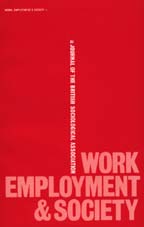No CrossRef data available.
Article contents
Braverman and the Contribution of Labour Process Analysis to the Critique of Capitalist Production – Twenty-Five Years On
Published online by Cambridge University Press: 01 June 2000
Abstract
This paper seeks to reassess the contributions made by Braverman and subsequent labour process writers to the critique of capitalist production. Braverman's main motivation lay with the subversion of pro-capitalist ideologies. He identified deskilling tendencies with the capitalist imperative of accumulation in order to promote the case for revolutionary change. The labour process debate that Braverman helped to initiate, while successful in broadening understanding of concrete work relations, has difficulties in excavating the necessary interconnections of capitalist alienation and exploitation. In particular, there is a problem in separating out the different levels of analysis that link essence and appearance in the work context. Narrow focus on the labour process creates unnecessary conceptual confusion about the specificity of capitalist production, and also condones an unduly pessimistic political agenda on the prospects for transcending capitalist domination. In eschewing the important interconnections between workplace organisation and capitalist social relations, labour process analysis risks inverting the critical intent of Braverman's Labor and Monopoly Capital by promoting the continuation of the extant social order.
- Type
- Research Article
- Information
- Copyright
- © 2000 BSA Publications Ltd




